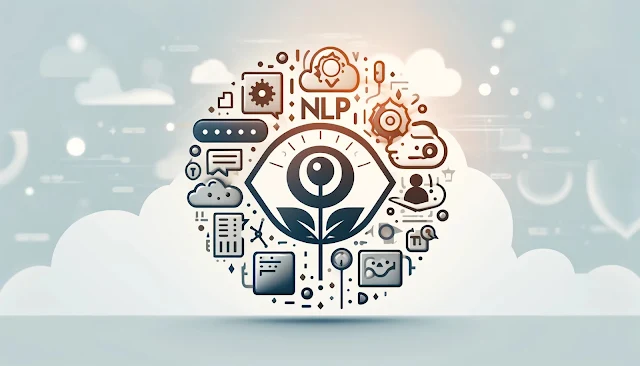Natural Language Processing (NLP) is a field of artificial intelligence (AI) that focuses on the interaction between computers and humans through natural language. This blog post explores NLP, its applications, benefits, challenges, and future trends.
Understanding Natural Language Processing (NLP)
NLP involves the use of algorithms and computational techniques to analyze, understand, and generate human language. Key components of NLP include:
- Tokenization: Breaking down text into smaller units, such as words or phrases, for analysis.
- Part-of-Speech Tagging: Identifying the grammatical categories of words in a sentence.
- Named Entity Recognition (NER): Detecting and classifying entities such as names, dates, and locations in text.
 |
| Illustration of key components of NLP, including tokenization, part-of-speech tagging, and named entity recognition. |
Image Prompt: Components of Natural Language Processing.
Key Applications of NLP
NLP is applied in various fields, including:
- Chatbots and Virtual Assistants: NLP enables chatbots and virtual assistants to understand and respond to user queries.
- Sentiment Analysis: NLP analyzes text data to determine the sentiment or emotion behind it.
- Machine Translation: NLP translates text from one language to another, as seen in services like Google Translate.
 |
| Examples of NLP applications, including chatbots, sentiment analysis, and machine translation. |
Image Prompt: Applications of NLP.
Key Benefits of NLP
NLP offers several benefits, such as:
- Improved Communication: NLP enhances communication between humans and machines.
- Automation: NLP automates tasks such as customer support and content generation.
- Data Analysis: NLP enables the analysis of large volumes of text data to extract valuable insights.
 |
| Infographic highlighting the benefits of NLP, including improved communication and automation. |
Image Prompt: Benefits of NLP.
Challenges of NLP
Despite its benefits, NLP faces several challenges, including:
- Language Ambiguity: Human language is often ambiguous and context-dependent, making it challenging for NLP systems to understand.
- Data Quality: NLP systems require high-quality data for training and accuracy.
- Computational Complexity: NLP algorithms can be computationally intensive and require significant processing power.
 |
| Infographic outlining the challenges of NLP, including language ambiguity and data quality. |
Image Prompt: Challenges of NLP.
Real-World Applications of NLP
NLP is being used in various real-world applications, such as:
- Healthcare: NLP helps in analyzing medical records and improving patient care.
- Finance: NLP is used in sentiment analysis of financial news to inform trading decisions.
- Legal: NLP assists in legal document review and contract analysis.
 |
| Examples of NLP applications in healthcare, finance, and legal fields. |
Image Prompt: Real-world applications of NLP.
Future Trends in NLP
The future of NLP looks promising, with trends including:
- Advanced Conversational AI: NLP will enable more natural and intuitive interactions with AI systems.
- Multilingual NLP: Improved NLP models will support multiple languages for global applications.
- Integration with Other Technologies: NLP will be integrated with other AI technologies such as computer vision and robotics.
 |
| Illustration of future trends in NLP, including advanced conversational AI and multilingual support. |
Image Prompt: Future trends in NLP.
Conclusion
Natural Language Processing is revolutionizing the way humans interact with machines. By addressing current challenges and leveraging future trends, NLP has the potential to enhance communication, automate tasks, and provide valuable insights across various industries.
 |
| Graphic summarizing the potential and future of Natural Language Processing. |
Image Prompt: Conclusion of NLP.
SEO Keywords: natural language processing, NLP, NLP applications, NLP tools, NLP techniques, NLP algorithms, NLP examples, NLP projects, NLP development, NLP benefits, NLP challenges, NLP trends, NLP future, NLP technology, NLP in AI, NLP overview, NLP concepts, NLP implementation, NLP solutions, NLP innovations.

Comments
Post a Comment